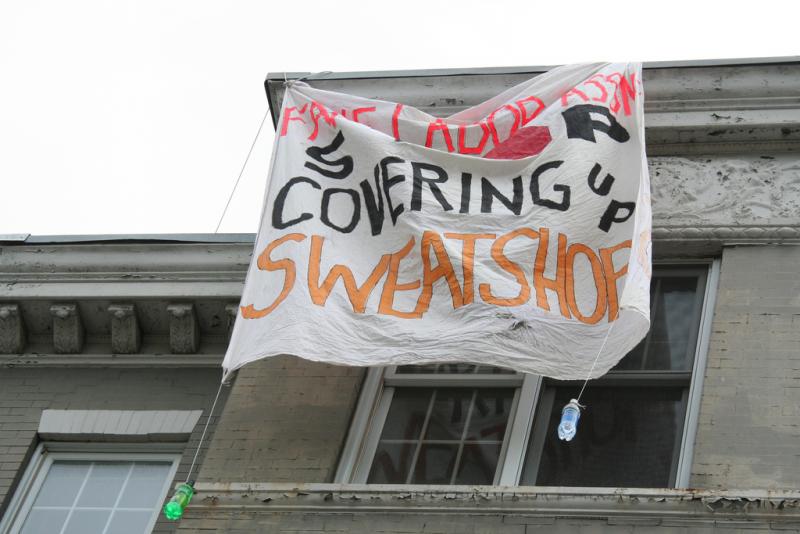USC Declines To Affiliate With Sweatshop Monitoring Organization

The Student Coalition Against Labor Exploitation (SCALE) began in the 1990s as a force for assisting workers on campus to negotiate union contracts. Over time, the group adjusted its goals to include a focus on persuading the university to condemn the use of sweatshop labor, and to act on that stance by only licensing clothing from companies that conform to certain labor standards in their factories. In April 2002, SCALE members partnered with a coalition called “Trojans for the WRC” (TWRC), expressing support for the national Worker Rights Consortium (WRC). TWRC demanded that USC publically affiliate with the WRC.
The WRC, founded in 2000 by a coalition of university administrators, students, and labor rights experts, is “an independent labor rights monitoring organization, conducting investigations of working conditions in factories around the globe.” Their goal is to “combat sweatshops and protect the rights of workers who make apparel and other products,” with a focus on investigating “labor practices of factories that make university-related apparel.” The WRC assists the colleges and universities with which it is affiliated in enforcing labor standards, ensuring that the rights of workers producing collegiate apparel and other products are protected. After conducting an investigation into a factory, the group publically publishes reports on that factory, and aids workers in “their efforts to end labor abuses and defend their workplace rights.” Over 175 colleges and universities currently support the WRC. USC is still not one of them.
The University was instead affiliated with the Fair Labor Association (FLA) until this summer. The FLA, another sweatshop monitoring group, has been criticized because, according to Nonprofit Watch, “three of the four nonprofits on the board of the FLA have been funded by clothing companies linked to foreign sweatshops,” indicating a clear conflict of interest in the work of the FLA. The New York Times reports:
“Many students complain that the group, called the Fair Labor Association, is dominated by apparel manufacturers and does not require enough disclosure about what monitors unearth. They argue that the association gives companies too much say over which factories are monitored and when.”
Despite the bias inherent within the FLA that likely affects its monitoring abilities, at least USC was associated with some sort of monitoring body. Now, the University is not even affiliated with the FLA, and still declines to affiliate with the WRC. Matt Curran, Director of Trademark Licensing and Social Responsibility at USC, remarked that the main reason the university will not affiliate with the WRC is because of cost, as the monitoring organizations require fees from their affiliates in order to operate. The fees the university would have to pay the WRC would take money out of other programs on campus. Curran stated:
“We do not oppose the efforts the FLA or WRC are undertaking, and we wouldn't deter a licensee from working with these organizations. However, USC created its own social compliance requirements in an effort to work directly with our licensees in a more targeted approach, and we believe university resources are better spent in this directed manner."
These compliance requirements consist of the USC Workplace Code of Conduct. Licensees of USC are required to meet certain standards regarding workers’ rights. According to the website for information on trademarks at USC, “as a matter of principle, the University of Southern California (USC) does not support actions that denigrate, coerce or exploit workers in any industry.”
Yet, how can the university be sure that the products sold with the USC logo are not made with sweatshop labor if USC does not commit to the one monitoring group that ensures transparency and accountability within the production process? How can the university be one hundred percent sure that the factories which supply USC apparel are respecting workers’ rights, in line with the USC Code of Conduct?
SCALE is currently pressuring USC to affiliate with the WRC, an action that would indicate that USC is willing to make absolutely sure that fair labor standards are enforced. After almost a decade of attempting to persuade the administration to even think about affiliating with the WRC, SCALE refuses to give up, and is instead working harder than ever to garner student support.
To get involved with SCALE at USC, contact them here.
Reach Senior Opinion Editor Cara Palmer here or follow her on Twitter.
Best way to find more great content from Neon Tommy?
Or join our email list below to enjoy the weekly Neon Tommy News Highlights.



